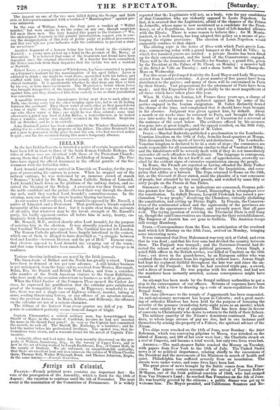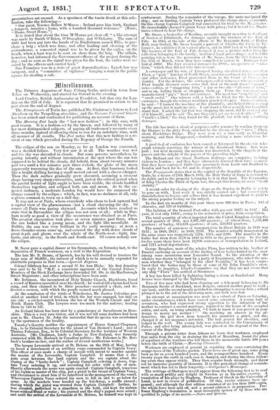Amp nub &hula inerrez.—Frenela political news contains one important fact
: the vote of the prorogation of the Assembly, which is fixed for the 10th of August; the vacation to continue until the 4th of November. The next event is the nomination of the Committee of Permanence. It is widely
reported that the Legitimists will not, as a body, vote for any candidates of that Committee who are violently opposed to Louis Napoleon. In
fact, it is averred that the Legitimists, afraid of the chances of the Prince de Joinville, whose name is now mentioned as a candidate for the Presi- dency, or of a Republican, have struck up a kind of left-handed alliance with the Elysee. There is some reason to believe this ; for M. Monts. 'ember% it is well known, has long adopted this policy as a means of pro- longing the regime provisoire. The election of Louis Napoleon would eminently conduce to that object. The stirring topic is the series of fetes with which Paris greets Lon- don ; commencing today with a grand banquet at the Hotel de Vile; to which five hundred guests are invited : a private theatre has been fitted up for their entertainment, and the band of the Conservatoire engaged. There will be the fountains at Versailles for Sunday ; a grand fête, given by the President at the Palace of St. Cloud, on Monday ; a monster ball at the HOtel de Ville on Tuesday ; and a sham battle in the Champ-de- Mars on Wednesday. For this scene of prolonged festivity the Lord Mayor and Lady Mayoress started from London yesterday. A great number of free passes have been distributed to the guests; and many of them will be entertained in Paris by their friends. Vast preparations for the adornment of Paris have been made ; and this Exposition fete will probably be the most magnificent of all those which have taken place this year.
When N. Cabet, the Icarian, left France three years ago, a charne„, of fraud and embezzlement was preferred against him by some of the parties engaged in the Icarian emigration. M. Cabet distinctly denied the charge at the time, and complained that it should have been brought in his absence. Judgment was given against him, by default. About a month or six weeks since he returned to Paris, and brought the whole case into notice by an appeal to the Court of Cessation for a reversal of the sentence of the court below. The evidence offered by his accusers was gone into at great length ; and the appeal resulted, on the 26th July, in the full and honourable acquittal of N. Cabet.
ITALY.—Marshal Radetzky published a proclamation to the Lombardo- Venetian kingdom on the 19th of July, from his head-quarters at Monga. This document has the merit of brevity and distinctness. The Lombardo- Venetian kingdom is declared to be in a state of siege; the communes are made responsible for all assassinations similar to that of Va.ndoni at Milan; and the inhabitants will be severely dealt with if they do not immediately surrender all such offenders to the military. The language is courageous, the tone vaunting, but the act itself is one of apprehension, avowedly ex- cited by the evident signs of extensive organization among the people. In Rome, the French are reported as having offended the Holy Father beyond forgiveness, by ejecting the officers of the Inqnisition, and occu- pying that edifice as a barrack. The Pope returned to Rome on the 16th, not, as the Giornale di Ronuz stated, amid the plaudits of a vast concourse of people, but attended by his usual guards, and watched by some fifty or' sixty people on the Piazza di San Pietro.
GERMANY.—Except so far as indications are concerned, German poli- ties praent few facts. In Hesse Cassel, Hassenpfiug is triumphant over the constitution. In Anhalt Dessau, Leopold Frederick has issued a pro- clamation "to my people," dissolving the Chambers, virtually abolishing the constitution, and setting up Divine Right. In Prussia, the Conserva- tives of the sentimental school and the squirearchy of the provinces are delighted at the appearances of things, and joyously assert that all goes well. The trying question of reviving the Provincial Diets is still hung up, though the said Conservatives are clamouring for their reestablishment. The Emperor of Austria has not gone to Gallicia. The Austrian troops still occupy Hamburg.
INDIA.—Correspondence from the East, in anticipation of the overland mail which left Bombay on the 25th June, arrived on Monday, bringing some interesting news. It was rumoured that Dost 3fahommed was very sick at Cabul, and even. that he was dead ; and that his four sons had divided the country between them. The Punjaub was tranquil ; and the Governor-General had di- rected the release of seventy-two political prisoners. Jewan Singh, a noted Sikh officer in the British service, was killed at 17mritsir on the 10th June - cut down in the guard-house, by an European soldier who was confined there for absence from his regiment without leave. Jewan Singh had kept his regiment faithful throughout the late war and since the an- nexation of the Punjaub : for this he had received triple pay, a sword, and a dress of honour. He was popular with his soldiers, and had not the murderer been instantly arrested, serious consequences might have An attempt has been made by the Bengal military authorities to put a stop to the extravagance of our officers. Returns of expenses have been. demanded, with a view to drawing up a code of mess-regulations for the Bengal Army. The state allowance to the temple of Juggernauth has been suspended. An anti-missionary movement has begun in Calcutta ; and a great meet- ing of orthodox Hindoos has been held for the purpose of lessening the severity of the penance (wandering forty-eight years as an ascetic) which loss of caste entails by way of expiation. This has been done in favour- of converts to Christianity who desire to return to the faith of their fathers.
The military anarchy of the Nizam's dominions continued. The sol- diers, to whom large arrears of pay are due, had in one instance paid themselves by seizing the property of a Fakeer, the spiritual adviser of the Nizam.
Two ships were wrecked on the llth of June, near Bomliay : the Atiet Rohoman, which was conveying pilgrims to Mecca, was wrecked on the island of Kenery, and 200 of her crew were lost ; the Charlotte struck on a reef at Jingoora, and became a total wreck, but only two lives were lost.
AMERICA.—The- mail-steamer Baltic reached the Mersey on Tuesday, with papers from New York to the 19th of July. The United States news is of no political importance, relating chiefly to the excursions of, ' the President and the movements of his Ministers m search of health and, quiet. Philadelphia has suffered severely from an inundation. The streets were under water, and some lives have been lost. The great piece of news brought by the Baltic comes from San Fran- cisco. -The papers contain accounts of the arrival of Terence Bellew Whianus, one of the Irish political convicts of 1848, who had escaped from Van Diemen's Land ; he reached San Francisco on the 5th of June. He was heartily greeted by the citizens ; a public dinner was, getup to welcome him. The Mayor presided, and Californian Senators and Re- presentatives sat around. As a specimen of the toasts drunk at this cele- bration, take the following- " Our guest, Terence Bellew M‘Manus : Ireland gave him birth, England a dungeon, America a home, with a hundred thousand welcomes." (Music, "Home, Sweet Home.") It is stated that about the time M‘Manus got clear off, "a like attempt was made by Smith O'Brien, O'Donoghue, and O'Doherty. The sum of 600/. had been put into the hands of an Englishman named Ellis, to pur- chase a brig ; which was done, and after loading and clearing at the customhouse, a concerted signal was to be given by the exiles, on the beach, when a boat was to be sent on shore from the brig. The villain, however, had informed the Government-officers of the project during the slay ; and as soon as the signal was given for the boat, the exiles were se- cured by the officers and carried back." San Francisco was in a state of great demoralization ; Lynch law was rampant, and a "committee of vigilance" hangiug, a man in the public square for stealing a safe.



























 Previous page
Previous page